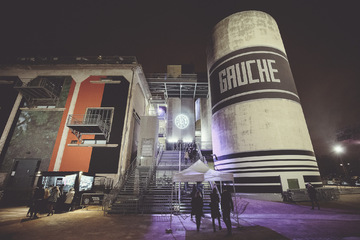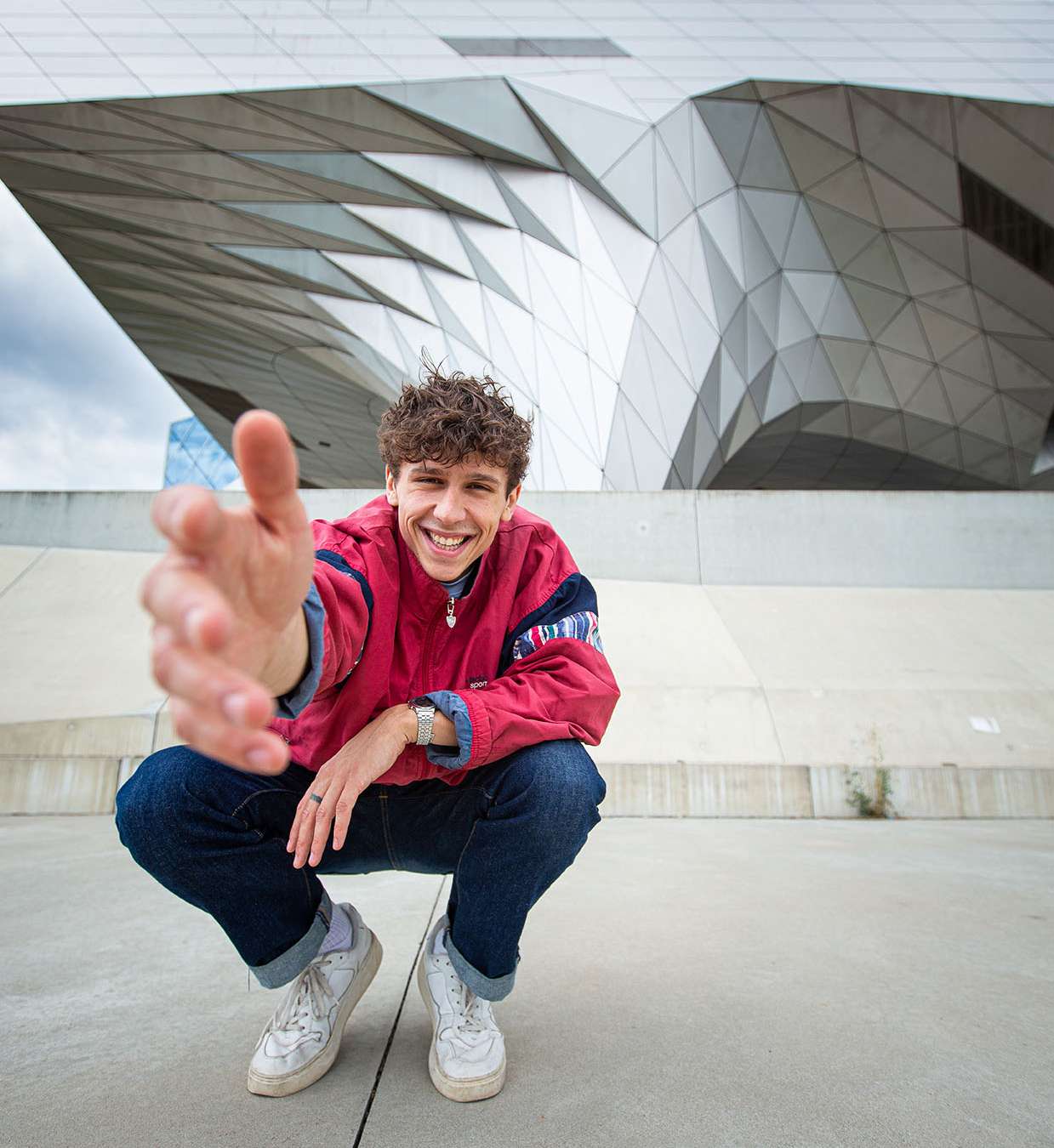
©
Gaétan Clément

Originally from Mornant, 27-year-old El Bobby is one of the most promising rappers on Lyon’s scene. With the support of the Ninkasi Music Lab, he took part in last year’s Woodstower festival and has just released his third EP – Croquis Volume 3 – featuring the single Fils de Boomer (son of a boomer). There is a paradox here: while El Bobby has a melancholy soul, the man behind the stage name – Samy Triboulet – is infectiously cheerful. This Jekyll-and-Hyde artist is one to watch, particularly on the social networks, where, along with his partner in crime, Alexandre Mameli, he explores a complex world through skilfully produced videos and (auto-)fictions.
You’ve been playing at venues in Lyon since 2021, but many discovered you through the parodic video project ‘Ceci n’est pas un président’ (this is not a president), in 2022…
Before the presidential elections, there were posters everywhere. Alexandre (Editor’s note: surname ‘Mameli’, the director) and I felt that it was kind of absurd to see these politicians with make-up and staging like us, i.e. artists, when they’re doing politics. The stakes involved in running a country and selling music aren’t the same. We had the idea of turning things around by using the same means of communication as them (Editor’s note: the release was supported by a flyposting campaign).
Behind El Bobby is Samy Triboulet, originally from the town of Mornant; what was it like growing up there?
My mother still lives there. I grew up with my three brothers and sisters. I was the last of a big family. My grandfather had ten brothers and sisters. Mornant is far away enough from the city for news not to really get there. Until I was 10, it was a perfect family life and I had lots of kind people around me. Then, as happens in many families, my father left and I found myself in a different reality. I’m not talking about it to complain; it’s just that it was an episode that marked a change, a shift; it was the first time I started questioning things.
What are your earliest music-related memories?
My father played music and we listened to French pop, like Jean-Jacques Goldman and Georges Brassens. There was also Michael Jackson. The first rap music I remember was probably Ghetto Millionnaire by Black Mamba and La Tribu de Dana by Manau, but I really started getting into it with my best friend, listening to LIM, Mister You, Rohff, Booba. By myself, I discovered Youssoupha, Orelsan, Nekfeu…
You often say that you’re a musical ignoramus…
I can’t play any instruments and I can’t read a note of music. That’s what I mean by ‘musical ignoramus’. I compose instinctively, I write and luckily I have good people to help me. For a long time, it was hard because it’s like at school, when you want to get started, you’re 17 or 18 years old, and you haven’t grown up playing an instrument, so it’s obviously more difficult.
When did you know you could make a career of it?
I didn’t think I would make a career of it, but I quickly felt that I had something. The aim for me was above all to have fun, enjoy myself and let off steam. Because rap really is like a safety valve. It’s like sport. People may not realise it from the outside, but it’s really physical. When you rap, it’s like when you’ve been for a run; it’s the same kind of feeling. There’s a physical, sporty side to it, because it involves breathing and movement. There’s also writing and emotions. This is what got me hooked and has made me stick with it.
You have a very cinematographic approach to music; there are a lot of videos and work put into staging…
It’s hard to stand out in music. Because we don’t have a grounding, we try to do other things to get noticed. We grew up at a time when music is strongly linked to images. We’re not interested in just making videos where we dance around in front of the camera. If we’re going to make videos, they have to be inspiring, convey messages and carry things that have meaning. We try to go deeper, to create an experience beyond the video, so that people who watch them feel what we were feeling when we made them.
Beyond Samy, El Bobby belongs to a group, a collective; where does the name come from and how does it work?
I’m Bobby and the project is El Bobby. The ‘El’ represents a collective that varies in size. It’s also a duo made up of Samy and Alexandre. We’ve really been running the project together since ‘Ceci n’est pas un président’. He’s very resourceful; for him, any idea can be realised if you give yourself the means. It’s really encouraging to work alongside someone like him, because everything becomes possible. Playing at Woodstower, for example, was an amazingly proud moment! As for ‘Bobby’, it’s simple: in Lyon, people say ‘pélo’, ‘mec’ or ‘gars’ when they’re talking to someone (Translator’s note: similarly to ‘fella’ or ‘dude’ in English). Bobby is the same; you can say ‘hé Bobby’ when you don’t know someone’s first name, like an ordinary bloke… but not one carrying a briefcase (laughs!).
Who works alongside El Bobby?
There’s NovoPol, who does melodic techno. I love his rhythms and I’d wanted to rap over techno for a long time, because at a techno concert people are in their own little worlds, as if they’re hypnotised; it’s the opposite of idolizing a single person. Paul is really a good listener; he tries to understand the things I mumble and it’s brilliant for me. There’s also Noé on the production side. He’s a sound engineer and he helps me a lot with the artistic direction and he’s always giving ideas. There are loads of things that people really like in our sounds that he came up with. Then there’s Jolan, for photography, Alex, for the videos, and Lola (Editor’s note: she wasn’t present on the day of our photo shoot). It’s really important to work with other people; for me, there’s no sense in doing everything alone.
How would you define El Bobby’s musical style; what are your favourite themes?
The first albums, Croquis Volume 1 and Croquis Volume 2 are aptly named (Translator’s note: ‘croquis’ means ‘sketch’), because they allowed me to explore and search for my identity. On Croquis Volume 3, I started to find it. I’m moving towards something very close to slam. I want to talk, to tell stories, just with my voice. I often talk about incoherencies in today’s world, about cognitive dissonance. We want certain things, but we do the opposite; it’s crazy isn’t it? We talk about that in ‘Des tours et du béton’ (towers and concrete).
At the same time, we’re lucky. We tend to complain, but we do have a lot of possibilities. Our generation has lots of struggles to be made and everybody has a role to play. Of course, some people are always excluded, or don’t have the choice, but, in this country, we have freedom of expression and the ability to try to change things. What I want to do is to awaken my senses, my consciousness. People need to ask themselves questions, ask themselves if what is happening around them is normal, and find things that motivate them more than just social networks.
You also play on digital communication, digital interactions and screens, for example with the interactive video ‘Une nuit sans fin’ (an endless night)…
In the beginning, we just wanted to ask people to choose the next single to be released; then we went even further with a multiple-choice video. It’s a great idea, but we won’t be doing it again, because it goes against what I want to do, which is to get people to put down their phones. I realised that, in order to change things in life, you need to invest in projects that change yourself. If you prefer being around nature than in the city, then make the choice to move to the countryside. You’ll have to rent a lorry, pick up your phone to call your colleagues, and so on… But three months later, you’ll have forced yourself to do something and your life will have changed. That’s what El Bobby is about: it’s about being in reality and going out into the street. I don’t want to create content for the Internet; I want to create content in life, to create experiences.
Lyon isn’t necessarily the obvious choice for rap music; do you ever think about moving somewhere else?
I like Lyon. I really think it’s one of the most beautiful cities in Europe, so I’d never go to another city! If I did leave, it would be to go to the mountains. In terms of rap, things are changing fast. Sasso, for example, had an album certified gold recently.
What do you see as the next steps in your career?
It’s possible now to lead several lives. Now, I’ve started working in music and there are plenty of signs telling me that I should stay, so I will try. I’m living all this like a chance, an opportunity. My goal isn’t for people to remember our names, but to come away saying they had a good time. I love what Kyan Khojandi has done with his show. You laugh, but you learn things; you come away with knowledge. There’s also Ben Mazué , who introduces a narrator on stage, which really connects with me; it reminds me of the animated film ‘Le roi et l’oiseau’ (The King and the Mockingbird), which immersed spectators in the action. That’s what I want: to have one foot in theatre; for the music to be a show. Making people dance is important, but I’m sure that there’s a way to do even more.
A trained cook, Samy Triboulet, aka El Bobby, has just released his third album: Croquis Volume 3. It is the last of an exploratory musical trilogy that began in 2021, which set itself no limits, mixing styles and rhythms to produce rap that is both melancholy and makes you want to dance, combining electronic music, slam and impactful lyrics. Since coming to public attention in 2022, during the presidential elections, with the parodic project ‘Ceci n’est pas un président’, the young 27-year-old rapper has established his Stromae-esque style, with a gentle attitude and a smile, as well as his collective approach, through various collaborations with other artists, musicians, directors, singers… The musical world he has created (which was rapidly noticed by the teams at Ninkasi Music Lab and Woodstower) speaks out against absurdity and alienation in the modern world, playing on today’s codes through the use of images and social networks.
“For the concerts, the place, the rooftop with a view over the city, the programme and the stairs. For all the stories that have happened there (laughs!).”
La péniche Loupika“An iconic boat bar with really nice people, like Léa, who’s super accessible, and very open-minded about who plays there. We filmed our first music videos there.”
Maria Pizza“I love eating and I’m of Italian origin, so I have to mention this place. It’s affordable and they make really good Neapolitan pizzas.”
“It’s more expensive, but this is an awesome restaurant; I love it!”
Lyon 1er“I love walking along the banks of the Saône; it’s so beautiful.”
Le Pilat“It’s an hour away from Lyon, so it’s very accessible. It’s one of the places in Europe with the greatest variety of flowers. In autumn, you won’t find me in the city much, but out there, in the woods, picking ceps, because there’s tons of mushrooms there!”
Les bric-à-brac du Foyer Notre-Dame“I like wearing second-hand stuff and I’ve found loads of things here. Above all, the money it collects is used for a good cause.”